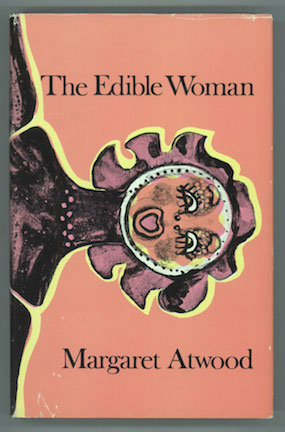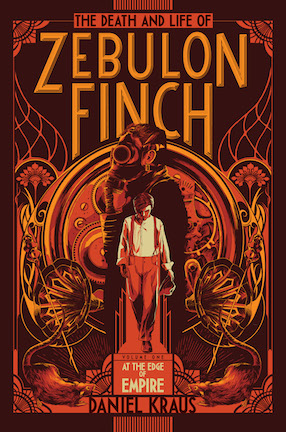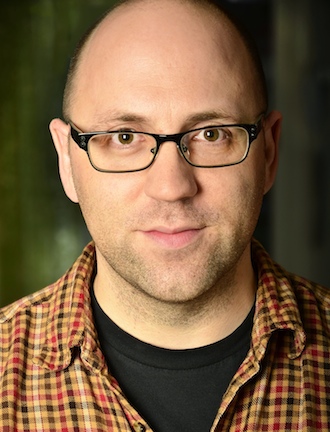Daniel Kraus is the author of horror classics Rotters, Scowler, Trollhunters (with Guillermo del Toro) and the new twisted macabre thiller, The Death and Life of Zebulon Finch. We recently met in a lonely, haunted wood resounding with eerie howls and eldritch screams to knock back a flask of cough syrup and discuss the state of contemporary literature.
You review a lot of books. Do you feel the weight of negative opinions when one of your own comes out? Have you ever been kind to a book that was fatally flawed because you related on a personal level to how hard the author seemed to have worked on it?
Well, I used to review a lot of books. I’ve have a role now in which I review very few. Regardless, good question. Naturally I feel that weight, but I also know, to an extent few others do, how fantastically arbitrary the process is. It really, truly is. Some of the best youth books I’ve ever read received not a single starred review. It’s an imperfect system. It’s not even close to perfect. In fact, there’s something to be said for books that don’t sweep up all the stars: namely, that they are books that resist consensus, and among those numbers are a good chunk of the most vital books that exist. So, yes, to name one of my biases: ambition. I’ll take an imperfect stab at something monumentally different over a perfectly crafted piece of china. That’s just me. Flaws are rarely fatal. And reviews, by the way, are not for the author. I don’t read my own reviews anymore. There are a few legitimate reasons I might read them, but, as I see it, a whole tower of reasons why I shouldn’t. I want to keep the process are pure as possible.
A decade ago I reviewed a novel by a very prominent author for a reasonably prominent paper. I am ashamed to say that I failed to reveal how lazy, derivative, and boring I thought the book actually was. I didn’t turn in a positive review, but it definitely girded against a backlash I feared for my own future work. Aside from how little it paid vs. the amount of effort that went into molding a thousand neutered words, the review became a review of my own ethics, and a willingness to expose myself. Failed at both. Maybe novelists shouldn’t be allowed to review other novels. We need a new generation of full-time critics, whose only conflict of interest is when other critics review their anthologies of criticism.
The idea of someone funding full-time book critics, beyond the few we have left, is fairly hilarious–though it sounds great! You’re talking about the New York Times model: get the best talent available (brilliant authors) to review the best books (by other brilliant authors). Who are we to doubt the New York Times? The journal I review for is recommended-only; in other words, in most cases, a really bad book doesn’t get reviewed. We’re also not the NYT trying to explain to someone if they should individually plunk down 20 bucks for a book. We’re talking to librarians who might themselves have no interest in the book but might very well need it for patrons who’ll love it. There’s a difference there. You say your review was neutered and I believe you, but it’s also possible that you were especially aware that there were human beings involved and that one should be gentle whenever possible with fellow humans. Maybe that says something bad about you as a reviewer, but it doesn’t necessarily say something bad about you as a person.
Well, yes. It’s just too hard to write even a lousy book. The emotional cost is tremendous. Novels are like exposed veins, just waiting for the IV drip of rude critique. Or, even worse, indifference. On the other hand, I’ve written widely about music and seem to have little or no compunction trashing songs or bands I deem unworthy. I know it’s completely hypocritical (Mick Jagger cries too), but somehow it just feels different. Maybe musicians are tougher-skinned. Or their investment isn’t quite as complete because there are often four or five of them to blame. It’s possible that being more accomplished with a sentence than a Les Paul is so inherently subordinate on almost any scale of hipness that a gentle hand is pure indulgence.
The more apparatus there is between the artist and the physical art, the easier it seems to criticize it. If I wrote a story or painted a picture, it might seem personal enough to give some people (only some!) pause before they laid into it. But if I made an album, there are layers of instruments and processing, and if I made a movie, there’s cinematographers and sound engineers and a million other things. It’s no coincidence that the biggest cesspools of snarky casual criticism are film-related. Movies are comparatively “easy” to consume and have “informed” opinions about. I mean, you can watch all of Quentin Tarantino’s movie in a single day. You’re not going to read all of Margaret Atwood’s books in a day.
How much would you pay to watch Tarantino’s version of The Edible Woman?
Zero cents. I’m not big on Tarantino.
So, you have a new book out.
I do. Do I need to explain it or did you do that in some sort of introductory paragraph? Surely you did.
Obviously you don’t follow my Twitter feed: @AgainstIntroductoryParagraphsForVaguePoliticalReasons.
OK, a little more about Zebulon Finch. As will become clear by the time the second (and final) book is over, it’s a statement project and done, I hope, in a way that alienates half the audience and makes the other half swear to kill on my behalf. It’s 1500 pages or so and still bursting at the seams; it’s taken so long to write and has presented such a challenge that I have, at times, felt untethered from reality, just sort of walking around numb. I’m about 20 pages from the end now and I feel emotionless about it. The whole experience has been confusing on an emotional level, even while it’s been fun on a day-to-day level and educational overall. I don’t know. I’m curious as to what kind of writer is going to come out the other end of it.
You’re on the record as loving the entire apparatus of authorial self-promotion. Please explain.
With very rare exception, any periods of promotion I’ve gone through would have been better served spending that time writing. A lot of stuff I don’t mind doing. I like doing interviews because I like chatting with interesting people and I really like writing emails. Emails hit that sweet spot for me — not as precious as a written letter but not a disposable as a text. But it’s true, I’m not a publicist’s dream client in that I turn down a fair amount of stuff. I don’t like to say “I don’t have time” because that seems to imply that everyone else is just swimming in luxurious free time — but, really, I feel that I don’t have time. I’m only writing on weekends. And I’m trying to work toward an ideal where my response to a response to my book is another book, and that’s it.
I couldn’t agree more. Twenty-six hours of Facebook flogging instead poured into opening paragraph rewrites would help innumerable novels, including all of mine. Do you ever go back and re-read your old stuff? How does it make you feel?
Do you mean go back and read my old social network posts? Or my books? Regardless, no. I would only read one of my books again if I were contemplating a sequel. Which I do from time to time, despite generally being against sequels.
You’re 16 and just got your drivers license. What are you wearing? What are you listening to? What are you reading? Are you still a virgin?
I lived in a small town in Iowa where pretty much no culture reached us that hadn’t already gone nationwide. There were no cool music stores. I didn’t know any cool older siblings. This would have been close to when Nirvana broke, so it’s probably safe to say I was listening to Nirvana and wearing flannel shirts. I was into “controversial” books around that time, but again, only the most well-known, so I was probably reading Naked Lunch or something.
I didn’t realize until recently that Allen Ginsberg grabbed a random pile of typed pages that Burroughs had lying around his apartment and grafted a relative order and coherence onto them, so in a brilliant editorial turn transformed a stack of disconnected ravings into Naked Lunch. Basically he was Gordon Lish to Burroughs’ Raymond Carver. Now, in a similar fashion, I would like you to take that tortured analogy and turn it into an entertaining and coherent response.
I don’t like Burroughs. I do like what little I’ve read of Ginsberg. I don’t know what to do with your analogy. Let’s just drop it.
I was at a baseball game in San Francisco during the first Gulf War. Some suit had the brilliant idea of letting Ginsburg read a poem before the singing of the national anthem. It was not pro-conflict. So I had the rare opportunity of seeing him booed by forty thousand people. The poem was completely drowned out, and eventually he just sort of slunk off the field.
(Kraus fails to answer, seemingly distracted by a blood-curdling chill that echoed over our heads and deep into the night. Then he went to work on a pair of carnitas tacos he miraculously produced from somewhere within his black trench coat.–eds.)
I’m working on a theory that I think has some legs: Roger Ailes convinced Donald Trump to run for president as a Trojan horse ploy to garner attention for all the other candidates, and it worked. Otherwise completely disinterested people now know who Carly Fiorina is, and who Ted Cruz isn’t. I think it’s plausible because there’s no way Trump really wants to be president. He’d be bored out of his mind. He’d start a war with Oman before the inauguration. He’d legalize polygamy and pardon Charlie Manson just to spice up a random Friday night. I guess the real theory here is that conspiracy has nothing on the power of tedium.
Have you read The Pale King? I haven’t but I’ve read everything else DFW wrote and, despite how he’s been bro-ified and movie-ized and turned into quote-a-day calendars, he really was a genius in a way I think only people with natural imbalances can be geniuses, and I feel like his attempt with his last novel to write about tedium was a brave act, because isn’t that what most people deal with all day, every day? And yet how to write about it, how to find meaning in it, that seems noble, partially because the writing of it must be so awful. I don’t think that’s where you were heading with your Trump theory, but there we are anyway.
Stephen King or H.P. Lovecraft?
I’d like a SK book as if written by HPL.
Mark Ruffalo or Benicio Del Toro?
Benicio.
Leviticus or Deuteronomy?
Ecclesiastes.
Soft Cell or Psychedelic Furs?
Neither. (this is not an acceptable answer -eds.)
The Leftovers or Fargo?
What or what now?






Catallaxy Files | Australia’s leading Libertarian and …